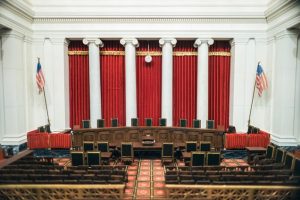Fourth Amendment
-
Tennessee Deputy Sued Twice In The Same Day Over A Roadside Anal Search And A Forced Baptism
There’s something you don’t see every day.
-
Federal Agent: Using A Taped Box To Send Stuff Overnight Via FedEx Is Suspicious Behavior
Obviously criminal activity.
-
-
Artificial Intelligence Law Is Here, Part Three
Many open questions remain related to how to regulate AI, such as how we might create laws and policies that protects the public while promoting innovation.
-
In His Carpenter Dissent, Thomas Gives Nod to Emerging Legal Technology
What do words really mean?
-
* It’s checkout time at the Supreme Court, and courtroom correspondent Mark Walsh is ready to reveal what’s in his shopping cart. [SCOTUSblog]
* Being cited by the Supreme Court is usually something to boast about — but not always, as Adam Feldman notes in this thoughtful analysis of how much oral arguments matter. [Empirical SCOTUS]
* Will Baude breaks down the Court’s intriguing debate over stare decisis in South Dakota v. Wayfair. [PrawfsBlawg]
* Joel Cohen looks at why the federal judiciary gets better treatment from the press than the other two branches of government — and whether the differential is justified. [The Hill]
* Orin Kerr identifies an interesting issue: if a police officer uses Google Translate to try and request consent to search from a non-English speaker in that person’s own language, is the consent valid if Google Translate botched the translation? [Volokh Conspiracy / Reason]
* There’s a long and bipartisan tradition of… the federal government spying on reporters, as Charles Glasser explains. [Daily Caller]
* Speaking of the media, Jean O’Grady points out a helpful new resource from CQ for consumers of news, along with tips for how to tell whether or not a story is “fake news.” [Dewey B Strategic]
* If reforms come to university boardrooms, let’s hope they include law schools as well. [ProfessorBainbridge via Instapundit]
* An interesting new use of voice-activated technology, courtesy of Wolters Kluwer: getting insights into federal tax law. [Artificial Lawyer]
* If you’ll be in New York on Tuesday, July 17, raise your glass with fellow young lawyers, summer associates, and law students, at the UJA’s Summer Law Happy Hour. [UJA Federation of New York]
-
* Amazon is struggling to protect law enforcement from turning the Echo into a permanent wiretap. Maybe they should ask Alexa if she can find some caselaw. [Law.com]
* Is this the next Solicitor General? [National Law Journal]
* In case you missed it, a bunch of whiny snowflakes are complaining that law schools don’t respect their opinions. [Volokh Conspiracy / Washington Post]
* If you’re wondering what life might be like in a totalitarian version of America, consider this profile of Jones Day. [American Lawyer]
* Kellogg Huber is now Kellogg Hansen for those keeping score at home. [Kellogg Hansen]
* Summer Associate hiring hit a wall last year. Not a good sign for the fragile 3-hour lunch industry going forward. [Am Law Daily]
* Dewey & LeBoeuf’s Stephen DiCarmine has gotten the government’s documents surrounding the Frank Canellas plea deal. [Law360]
-
The Geek Squad is on the case! But maybe they shouldn’t be.
-
* GCs just keep getting raises. Some reports suggest compensation is up almost 7 percent this year. But don’t worry — they’ll still bitch and moan about Biglaw associates getting a small cost of living bump. [Corporate Counsel]
* If you haven’t been paying attention, William & Mary Law School has been on FIRE lately. No, literally, the school is on fire. Call 911. [WAVY 10]
* Seventh Circuit may soon rule en banc to ban sexual orientation bias. You know, until Congress and the President impeach the entire Seventh Circuit to bring it back. Wow that was an absurd sentence and yet it’s entirely plausible right now. [Law360]
* Kelley Drye enters the Texas market. [The Am Law Daily]
* Heroic big banks are demolishing patent trolls while everyone else continues to suffer, which sounds about right. [Law.com]
* China’s got a new cybersecurity law and it’s not good news for foreign businesses. [Fortune]
* But don’t worry, the U.S. is now just as intrusive with new rules taking effect today that allow judges to order broader government hacking for investigative fishing expeditions. So… yay! [Ars Technica]
-
Cyberlaw, Federal Government, Google / Search Engines, Privacy, Technology
If the Government Wants Your Email, It Gets Your Email
We’ve been talking a lot recently about the secretly authorized stuff our government does to us — like killing us, or molesting us at airports. Here’s another one for the list: digging through our emails or Twitter feeds or cell phone data, without probable cause, our permission, or our knowledge. How does the U.S. government circumvent basic probable cause and search warrant requirements when it wants electronic information? Let’s see….
-







